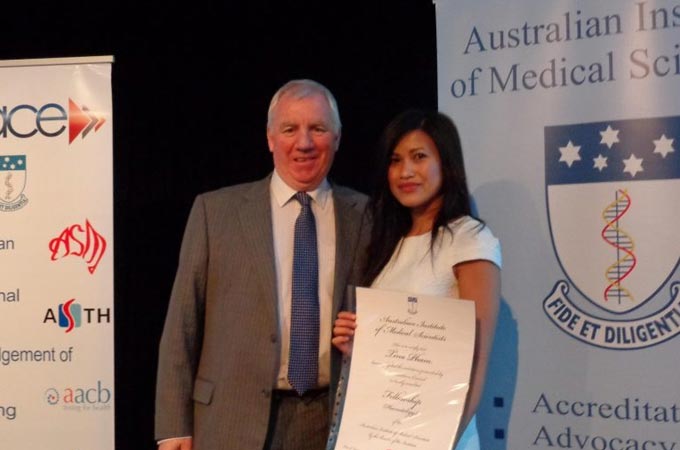Australia is home to some of the world’s highest quality pathology services, and top-quality education and training are central to the sector’s vitality. With that in mind, to celebrate the hard work of pathology professionals this International Pathology Day, we take a look at some of the country’s leading fellowship programs undertaken by scientists to further their expertise.
Australian Institute of Medical Scientists
The first AIMS Fellowships were awarded in 1946. Enrolment is open to applicants who have been a Member of AIMS for at least two years. The program must be completed within five years and involves four stages.
Firstly, the candidate must complete two compulsory core modules (or four for the Core Laboratory discipline), and then two elective modules, in their chosen discipline. This is followed by an oral examination.
Finally the candidate must present one of the following:
- a) A scientific dissertation
- b) A relevant research degree thesis completed within the last two years (e.g. Honours, Masters or PhD)
- c) A relevant paper published in a peer reviewed journal within the last two years, provided the candidate is the primary author
Pictured: Tina Pham receiving her AIMS Fellowship in haematology from Assoc Prof Tony Woods.
Royal College of Pathologists of Australasia
The Royal College of Pathologists of Australasia (RCPA) founded the Faculty of Science in 2009 to train and develop a career path for science graduates who have been working in pathology for at least three years.
The Faculty has two main pathways to Fellowship, via examination or published works.
The examination route involves a five-year laboratory-based training program and assessment in both oral and written exams. Trainees need to demonstrate they can use their professional judgment to advise clinicians, undertake their own research and provide strategic direction to the operation of the lab.
The published works route is for scientists who have outstanding research expertise; it requires a minimum of 30 peer reviewed publications, demonstrating a significant contribution to research and innovation.
Australian Society for Microbiology
Fellows of the Australian Society for Microbiology must have at least 10 years’ experience in the field of microbiology.
There are three parts to the process of obtaining the Fellowship. After a general examination in microbiology, comprising both written and practical tests, candidates then undertake a formal supervised examination in a specialist area as well as in the management of a microbiology lab.
Finally, the candidate must demonstrate he or she has a depth of understanding in a specialised area of microbiology. This could be done via a scholarly dissertation, demonstration of significant research (50 or more published papers) or proven experience (managing a major microbiology lab).
The various fellowships available to scientists working in pathology, and the amount of work involved in all of them, is proof of what we already knew – that the high-quality pathology services available to patients in Australia wouldn’t be possible without highly-skilled and hard-working pathology professionals.

